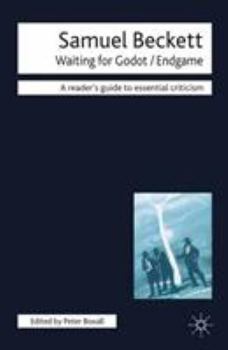Samuel Beckett - Waiting for Godot/Endgame
In this Readers' Guide, Peter Boxall traces critical responses to Waiting for Godot and Endgame from the 1950s to the present day. The guide presents the major debates that surround these works as they develop, from Martin Esslin's early appropriation of the plays as examples of the Theatre of the Absurd, to recent poststructuralist and postcolonial readings by critics such as Steven Connor, Mary Bryden and Declan Kiberd. Throughout, Boxall clarifies and contextualises critical responses to the plays, and considers the difficult relationship between Beckett and his critics. The ongoing attempt to interpret these enigmatic works not only sheds light on the plays themselves, but also helps us to understand the promise and the limits of our own critical discourses. The Guide explores the mutually enlightening relationship as it has evolved over the last five decades.
Format:Paperback
Language:English
ISBN:1840460822
ISBN13:9781840460827
Release Date:August 2003
Publisher:Red Globe Press
Length:194 Pages
Weight:0.68 lbs.
Dimensions:0.4" x 6.4" x 8.5"
Customer Reviews
2 ratings
I can't go on. I'll go on.
Published by Thriftbooks.com User , 17 years ago
God-(ot) never comes. The waiting for the God-(ot) who never is going to come is endless. But still the hanging tree / cross is there. You can hang yourself on it. Or not. He still won't come. The garbage cans are supposed to symbolize skulls. How people are trapped inside their skulls and how the potential for getting out of your skull and really being understood by another human being who is trapped inside his or her skull is futile.
Waiting and Waiting and Waiting and ...
Published by Thriftbooks.com User , 17 years ago
Waiting and Waiting and Waiting and ... Review of Play: Waiting for Godot - A Tragicomedy in Two Acts Written in: 1949 Premiere in: 1953 By: Samuel Beckett (1906 - 1989) Originally written in French and translated to English by the author himself. This play takes place on a desolate road next to a barren tree. There are two aimless men loitering and passing the time in discussion. They are soon joined by two others. The first act of the play lasts through one evening. The second act lasts through a second evening almost identical to the first. When ever the subject of leaving their spot arises, we learn that they can't leave because they are "Waiting for Godot" and need to stay at this particular spot on the road. There is a sense of timelessness. The second evenings (second act) seems to be slightly altered copy of the first evening (first act). The characters are "Waiting for Godot" and for salvation. Their wait for salvation might well be endless since all of them are loath to face their true motives, their real needs, their personal wants and honest desires. They don't seem to know why they are "Waiting for Godot" or what Godot (God?) will bring them. When they mention suicide they flippantly dismiss the subject. One time they say they can not hang themselves because they have no rope when in fact there is a rope lying on the stage as one of the few props. They appear to have voluntarily subjected themselves to a purgatory and don't have the courage or initiative to even question their situation. The discussion ranges from an inane account of boots being too tight to sophistic meanderings on the purpose of life. The characters seem to relentlessly keep talking to avoid facing something. We are not privy to any of their pasts or in fact any personal information about any of the characters. They might have been meeting on the desolate road for an endless time, so that any past that they had is lost in the mist of their memories. The nearly barren tree reminds them of a hanging tree and by implication a crucifixion cross. The tree dominates the stage background just as Godot dominates the lives; free choice and every expression of the four main characters. Does the milieu force the characters to think of salvation to the exclusion of a meaningful life? Could their need for salvation keep them trapped in a purgative existence where escape would be a form of condemnation which none of them could tolerate? The play "Waiting for Godot" forces the reader to ask questions of himself/herself. Review of Play: Endgame Premiere: 1957 By: Samuel Beckett (1906 - 1989) The play "Endgame" is set in a single room with only four characters. The two main characters (Hamm and Clov) bicker throughout. The other two characters (Nagg and Nell) are in trash cans in the room and someone needs to life the lids to talk to them. Nagg and Nell are Hamm's parents. Outside of the room it seems that either the earth is uninhabited o






